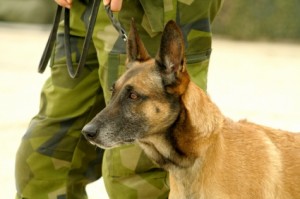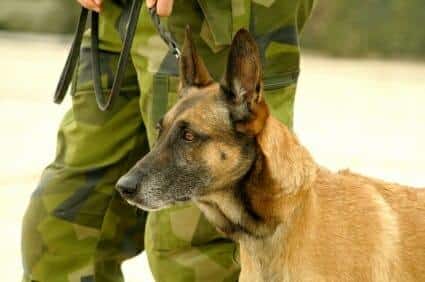The war on terror is an ongoing and costly beast of an operation for the American government. Billions of dollars are spent each year to protect not only own our freedoms, but to ensure safety and liberty around the world. The cost of anti-terrorism home and abroad is immense and unfortunately, necessary. Between the millions of soldiers, military equipment, and rebuilding infrastructure costs, we aim to cover all the bases when it comes to defending freedom and protecting citizens from the evils of the world.
It strikes me as ironic then that just a few months ago, it was one simple four-legged furry creature (reportedly equipped with not-so-simple titanium fangs) that was credited with the capture of the number-one enemy on the world’s terrorist list, Osama Bin Laden.
Of course, reasonably, we know that the Navy Seals and CIA operatives who ran Operation Neptune Spear deserve the credit for carrying out the strategic and successful mission, but what about this awesome dog? With all of our technology, machinery, and strategic planning, this well-trained military working dog named Cairo was a key part of the execution of the military operation and has brought to light the lives of these brave canine soldiers.
Military Dogs
 Arguably the some of the most loyal warriors on the battle field, military dogs play a major part in protecting our freedoms on a daily basis. They are trained in search and rescue, tracking and pursuit, foot patrols, etc.
Arguably the some of the most loyal warriors on the battle field, military dogs play a major part in protecting our freedoms on a daily basis. They are trained in search and rescue, tracking and pursuit, foot patrols, etc.
In addition to serving as a powerful auxiliary element in wartime, these dogs have one thing that humans or technology are incapable of copying: an extremely keen sense of smell. Often times, these combat dogs are the first ones to search suspicious areas for homemade bombs, which account for the vast majority of deaths in modern wartime.
Retirement
Currently, there are over 2,500 war dogs trained for war zones, with about 800 of these specially trained for combat conditions specific to Afghanistan and Iraq.
However, with operations in Iraq and, possibly Afghanistan, coming to an end for American soldiers, what happens to these dogs when these military operations come to a close?
Combat dogs usually retire at the age of eight or nine, making their military terms rather short. In the past, a retired military canine was insensitively considered “surplus equipment” and was normally put to sleep shortly after terminating their military service.
However, this all changed in 2000 thanks to ex-president Bill Clinton who signed Robby’s Law (H.R.5314), which requires that all military dogs that are suitable for adoption must be placed in an adoptive home if possible.
Adopting and Prepper-Training a Retired Combat Dog
The advantages of adopting one of these retired dogs are immense. Not only are you providing a home for a veteran of our country, but you’re also adding a valuable asset to your prepper profile.
An ex-military dog can serve as a key element in your home protection plan and can even offer health benefits to their owners. However, just because these dogs have military training, it does not mean that they will be ready to go just as soon as you bring them home. They, like all guard and service dogs, will need special training to fit your individual needs.
Home Security Champion
A combat dog has a large capacity for learning, and as far as home security goes, you won’t find a better alarm system. Just having a dog on your property serves as a preventative measure, as most dogs tend to alert their owners when there is someone or something entering the property. But can a guard dog really compare to with a traditional, electronic alarm system?
Well, even the best alarm systems have their limits. Typically, an alarm system normally goes off when someone is within close proximity, often setting off a sensor that is relatively close to a door or a window. A combat dog can be trained to sense any disruption or intrusion from a longer distance, giving you much more time to react to the situation.
Another benefit of having a military-trained dog is its ability to alert you to intruders in distinct ways. Whether it’s a series of loud thunderous barks to let the potential intruder know there’s a large dog present or a specific signal that is only known to you, these dogs really do offer the optimal level of home protection that can be personalized to your needs.
While it should be considered the absolute last option, remember that a guard dog can be trained as a tracker and in some cases, a weapon. This is extremely dangerous territory, so be careful when training an “attack” dog. These loyal animals should not have to risks their lives for you, but when needed (and only in extreme cases), they can be there to hinder an attacker through physical means.
Adoption and Training Needs
Adding a guard dog to your home security plan offers confidence and peace of mind, knowing that you have an extra set of eyes and ears protecting your property. However, in order to properly train a guard dog, patience and education is key for both of you. Investing in an experienced trainer may be costly, but it’s necessary to teach both how to work together to protect your property.
Keep in mind that many of these dogs may have had a traumatic history and will probably have unique needs. There will always be a few dogs that may not be suitable for training as guard dogs when they retire from military service. Before adopting one of these heroic dogs, make sure that you contact a service that specialized in adoption of military dogs. Military Working Dog Adoptions and Lackland Air Force Base are both great organizations to get information on military dog adoption and training.
Health Benefits
It’s not necessarily breaking news that your overall health improves just by having a pet at home. Dogs especially are often credited with reducing stress levels, improving heart conditions, and even motivating their owners to get out and exercise.
And although it’s an issue rife with controversy, some believe that dogs can alert their owners to impending seizures, strokes and heart attacks. While there still is a lack of confirmation on the reality of “seizure-alerting dogs,” there have been quite few studies that show that dogs are ultra-receptive to minute behavior changes in their owners and are able to react accordingly.
While the jury is still out the actual ability of dogs to smell or detect impending health emergencies, there is no doubt about their ability to serve as assistants for people with health issues.
Organizations such as Paws for a Cause train dogs to become partners for people who need a little help in order to be self-sufficient. Not only can dogs be guides for the blind or visually impaired, but they can also assist people with bipolar disorder, cerebral palsy, amputated limbs, and other conditions
Aging is for the Dogs
Dogs can often be trained continually to help us meet our own age-related problems. As we grow older, some of us will develop mobility problems, and a well-trained dog can help with everyday hurdles that become harder as we age. By learning how to help us with simple tasks such as picking up dropped items, pulling a wheelchair, assisting with balance, etc., these dogs can serve to increase our quality of life as we age, as well as be our loving friend. Really, what more could you ask for?
A True Prepper Pooch
Protection is thought by many to be the key to survival under any circumstances. As part of the survival manifest, we should all be taking self-defense courses, eating right, and consider arming ourselves all in the name of protection. Home security costs tend to be a costly investment, but with a well-trained, retired combat dog at your side, you’ll be able to add another element to your home security plan that’s impossible to buy— loyalty.
These silent and fearless canines deserve our respect and admiration, and, even more so, a place to live out their days doing what they do best, serving their owners. Why not support these beautiful animals and adopt a war dog today? With a little retraining for you and the dog of your choice, these animals can become a valuable resource and companion.
Seizure and Assistance Dog Resources
- www.adionline.org/
- www.pawswithacause.org/
- www.iaadp.org/
- www.deltasociety.org/
- www.inch.com/~dogs/service.html











